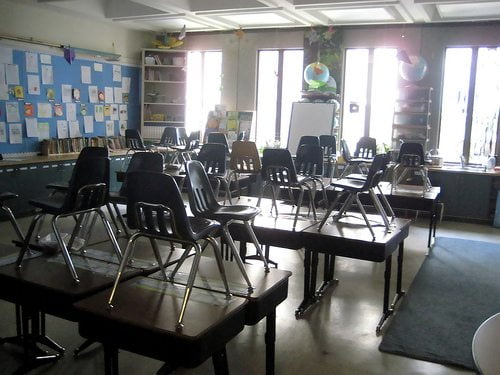

News
Climate change to remain on school geography syllabus
Climate change will continue to be taught in geography across key stages 1-3 in England, after education secretary Michael Gove scrapped plans to take it off the national curriculum.
The move represents a victory for a number of campaigners, teachers, environmentalists and scientists, as well as energy secretary Ed Davey, who had lobbied his fellow MP to reconsider his decision to remove the topic from the geography syllabus.
In a letter to Gove in May, Davey wrote, “As you’ll be aware, there has been a significant number of responses, both from academic experts and the public, calling for climate change to feature explicitly in the geography curriculum. I am writing to express my strong support for such a change.”
In the draft guidelines of the national curriculum, published in March, it appeared that climate change had been omitted from geography altogether, and instead, would be taught as an aspect of chemistry. Many said this move was reducing the threat of climate change among under-15s.
Within days, thousands of people had signed a petition on Change.org, set up by 15-year-old West London student Esha Marwaha, which called for Gove to reconsider his position. To date, the petition has attracted over 31,000 names.
Indeed, the campaigning appears to have paid off, with news of Gove’s U-turn running through on Friday evening.
The UK Youth Climate Coalition (UKYCC), which had been vocal in the campaign to reinstate climate change into the geography syllabus, tweeted its delight at the news. Meanwhile, Bob Ward of the Grantham Research Institute, who blogged in April about the “PR smokescreen” behind the decision, tweeted, “Victory!”
Next year’s national curriculum is due to be published in the next few weeks. According to the Guardian’s Patrick Wintour, “Those familiar with the final version say it will be clear about the role of humans in climate change.
“It will refer to how human and physical processes interact to influence and change landscapes, environments and the climate, and how humans depend on the effective functioning of natural systems.”
A poll in April by UNICEF found that almost 75% of young people aged 11-16 were worried about how the consequences of global warming will change the world. Seventy-two per cent agreed that they wanted the government to focus more on tackling climate change.
Further reading:
Government accused of ‘obscuring the truth’ by school climate change petition
Ed Davey calls for climate change to remain in national curriculum
Climate change to be removed from national curriculum
Poll: two-thirds of British children are concerned about climate change


 Environment11 months ago
Environment11 months agoAre Polymer Banknotes: an Eco-Friendly Trend or a Groundswell?

 Features10 months ago
Features10 months agoEco-Friendly Cryptocurrencies: Sustainable Investment Choices

 Features11 months ago
Features11 months agoEco-Friendly Crypto Traders Must Find the Right Exchange

 Energy10 months ago
Energy10 months agoThe Growing Role of Solar Panels in Ireland’s Energy Future





























